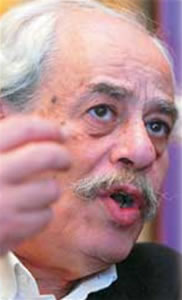 Khaleej Times: Veteran Lebanese film director and scri ptwriter Borhane Alaouie might give the Dubai International Film Festival a miss in the future. Well, it’s certainly not because he doesn’t like being part of the film festival. It’s just that he would now prefer to keep a safe distance from the limelight!
Khaleej Times: Veteran Lebanese film director and scri ptwriter Borhane Alaouie might give the Dubai International Film Festival a miss in the future. Well, it’s certainly not because he doesn’t like being part of the film festival. It’s just that he would now prefer to keep a safe distance from the limelight! The controversial filmmaker was in DIFF 2007 for the screening of his latest film, Khalass. “It is about three friends who survived the Lebanese civil war and still have a burning flame of life in their hearts. It is a story about love, hope, friendship and sacrifices made to conserve the truth,” said Alaouie.
Having his own revolutionary thoughts and philosophy about life in general, Alaouie feels that films cannot be constricted to any classification — any good filmmaker is free to mix genres in his or her works. “Time is the only judge and classifier of film productions. All artistic cinematic works can be measured by time. How do they stand the effect of time? It is just like the relation between the fire and the material and the gold is the only material to withstand the fire. Honest and genuine art work is the only one to last. Cinema is like a painting that reflects the civilised image of a country,” he explained emotionally.
In his words, cinema is the highest form of expression. “In my film, I wanted to expose the feeling of my generation which has been defeated by decades of ravaging wars. My people have been running after the illusions of ideologies accepting the division on the basis of sects. Lebanese people still have to learn the basics of citizenship and how to be true nationals. We should get rid of the sectarian extremism and then we can start building our country,” he pointed out.
Asked about the situation in Lebanon, Alaouie could not help but express his anger and frustration. “Advancing in life is an individual project. The will of change should be embraced by each one of us. Everyone should stand up against injustice and the blind machine of killings that won’t otherwise stop in my beloved country. Without revolution, we will become like bunch of cattles behind a leader or whatever,” said the filmmaker.
“I always try to depict the ugly side of the Lebanese society in my films. The education or the raising of awareness levels is the most important capital for a nation. In Lebanon, they still think selfishly. They have a tribe and sect-based mentality which is pushing most of the Lebanese away from each other,” he added.
Alaouie does not see any change taking place in the near future in the Arab socities. “We as filmmakers want to expose reality as it is. However, this reality may be ugly and cruel. But we are being obstructed — constant hurdles are being put in our way. Censorship is one such blocking device,” Alaouie maintained.
He concluded by saying “Arabic film production is still a director’s venture rather than an institutional endeavour”.
Alaouie has many films to his credit and all of them have been highly recognised at international film festivals. His works include La Yakfi An Yakoun Allah Maa al Fouqarah, Rissala Min Zaman al Harb, Rissala Min Zaman al Manfa, Aswan al Sad al Aali and Ilayka Aynama Takoun.
